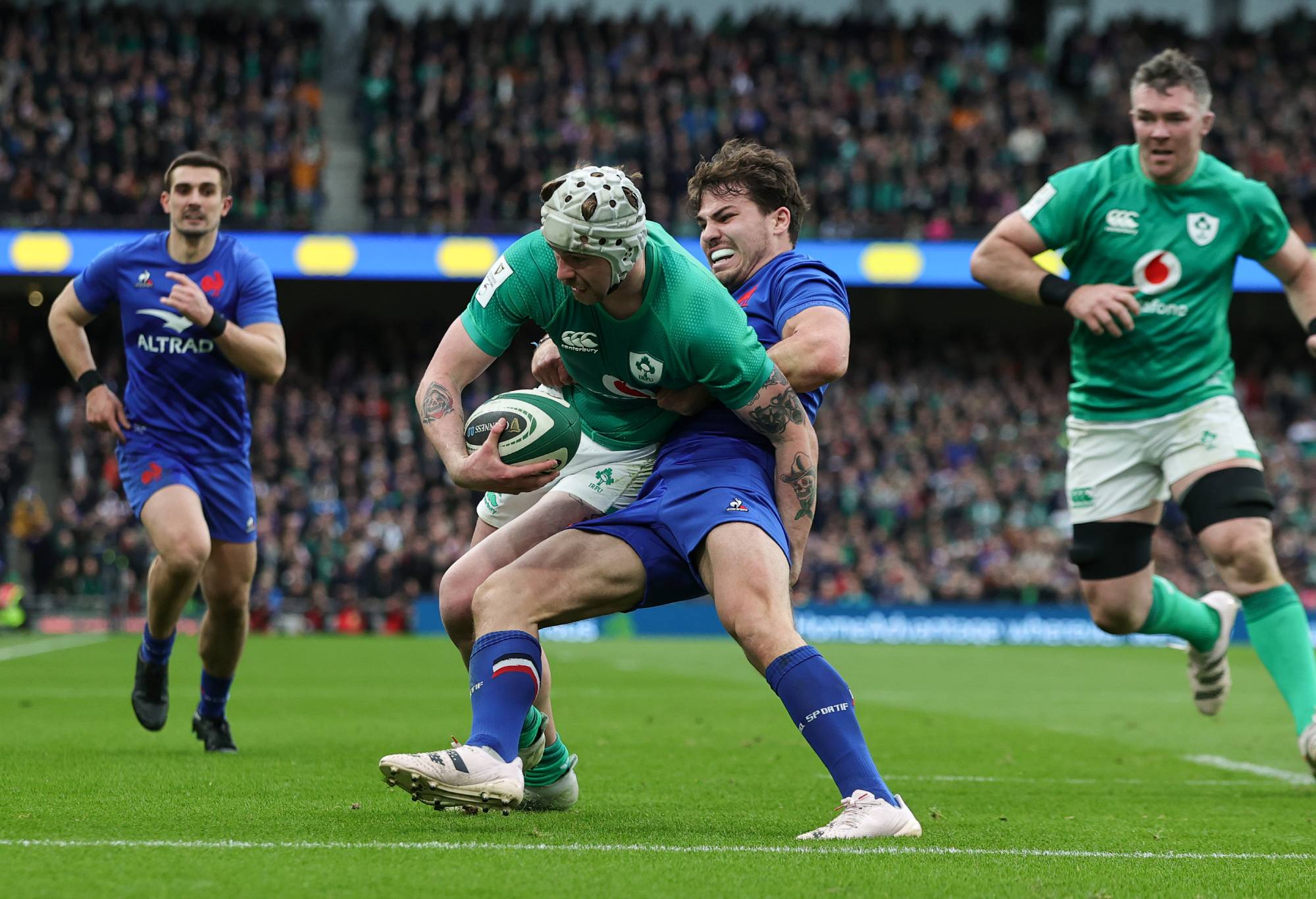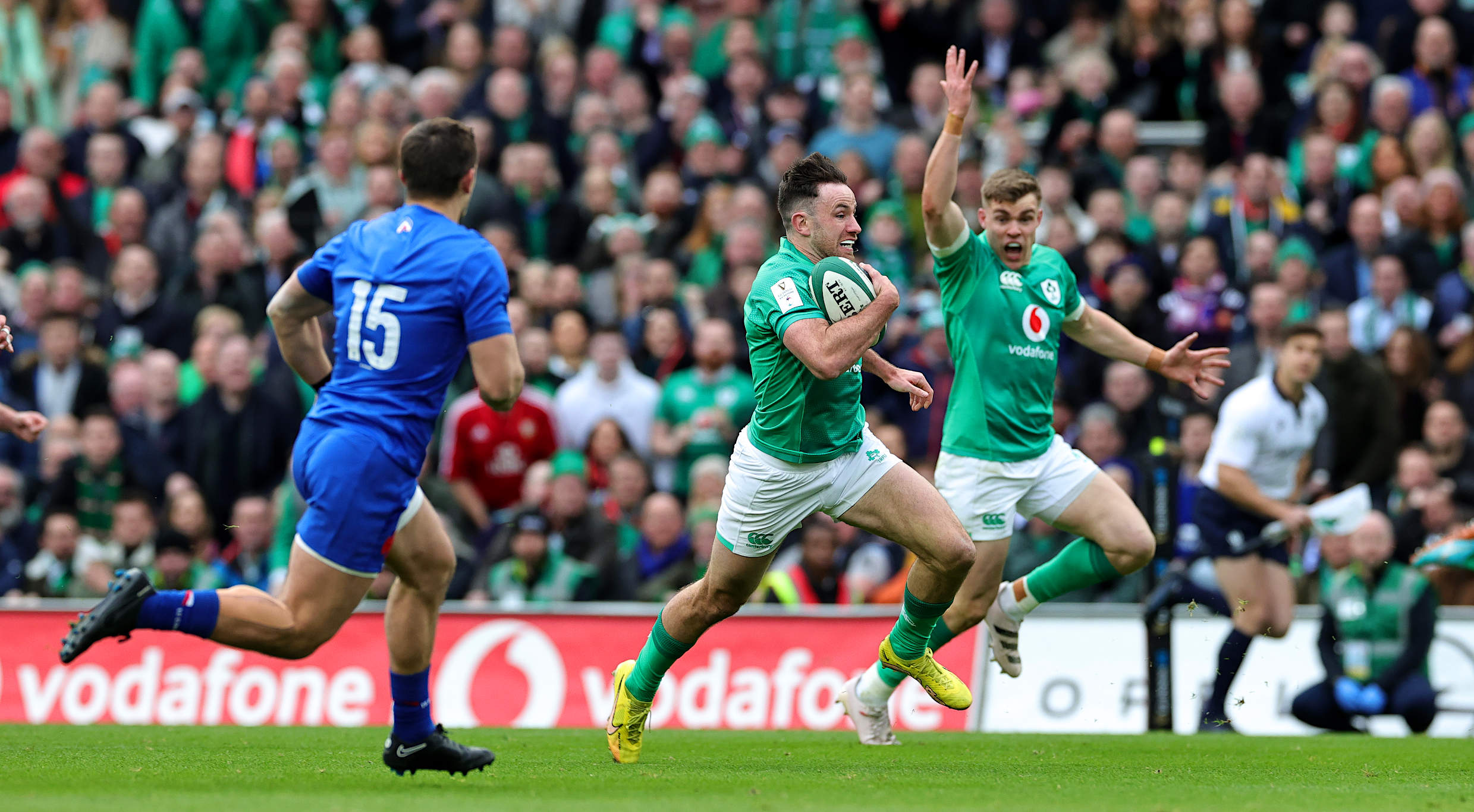There was once a cack-handed rugby administrator – sorry, that’s inaccurate, there have been a legion of such slack-jawed suits in committee rooms but you get the point – who insisted that the final game of the Five Nations Championship should be France against England, the two super-heavyweight sluggers that ruled supreme in the 90s, far ahead of the chasing pack, the only game in town and one that was duly dubbed Le Crunch.
TV, of course, was calling the shots and wanted the Grand Finale, the last day shoot-out with the title on the line. The initiative didn’t last long. Meritocracy and tradition held sway and back we went to the rotational fixture list.
And whadda ya know? I came over all cack-handed myself on Saturday as the thrill-a-minute action unfolded in Dublin, the gasps of astonishment at the sustained quality of play offset by that tiny little nagging thought that wouldn’t it have been wonderful if this had been the last-day decider?
And not, as it was, the first kick-off of the second weekend, all played out before tea and crumpets had even been served. Of course, how can you gerrymander the fixtures to ensure that you end up with the two best teams going toe-to-toe in the final match of Super Saturday, Ali vs. Foreman, an event for the ages, a promoter’s dream and box-office gold? You can’t. Or not reliably. It’s a tournament not a seeded knockout competition. But, even so, the 2023 title, an Irish Grand Slam possibly/probably already looks to have a certain routine formality about it. And that is not good for ratings. Or for Scotland fans who might justifiably get the hump at such presumptions.

Mack Hansen of Ireland is stopped by Antoine Dupont of France during the Six Nations Rugby match between Ireland and France at Aviva Stadium. (Photo by David Rogers/Getty Images)
At least in this World Cup year we have every chance of a reprise of these two fabulous outfits meeting in Paris. Mind you, that is slated to be a quarter-final encounter on the seedings. That was another administrative stuff-up, making the World Cup draw about half a century ago when the rankings were completely different. Football manages to do its World Cup draw only a few months before the tournament. Why can’t rugby? On current form it will be massively unfair for one of these teams not to make it past the quarter-final stage. France, the hosts or Ireland who have never been into the promised land of the last four. That’s madness. That’s rugby.
Ireland’s emergence as a real global force does nothing but good for the game. Rugby is a small, niche sport by comparison with the beast that is football and even when set against other sports be it basketball or athletics. Its showpiece event, the Rugby World Cup, has been in the hands of the few and all bar one of those reside in the southern hemisphere. It needs to reach out beyond its own narrow confines at every level with the Pacific Island countries making a proper mark or Japan continuing to keep its place at top table. It needs a wider competitive base. Above all, it need a new name on that trophy.
Welcome to the potential podium, Ireland, no longer daunted by expectation but relishing it. Of course, there is many a slip between cup and lip – and that World Cup draw is a banana skin the size of the Rocky Mountains – but there was so much resolve, self-belief and ambition in Irish ranks at the Aviva, so much strength-in-depth on show ( to counter what has been perceived as a possible fault line) that any bookies’ assessment of Ireland’s odds for the tournament have to have Andy Farrell’s side right up there alongside France.
Ireland have been bedeviled by injury across these opening weekends (as, to be fair, have France) but there was no sense of them feeling sorry for themselves, no sense whatsoever that they might rein themselves in to accommodate different (lesser?) talents.
No, there was trust emanating from every pore, flowing down from the man at the top, Farrell, to his Aussie-born, tighthead prop, Finlay Bealham, who shoved and ran and handled just like, er, Tadhg Furlong, the man everyone said Ireland couldn’t afford to lose.
The same was true of Conor Murray. Remember him – the veteran arch organiser and box-kicker at scrum-half, peerless in that regard, turning and tormenting teams in those narrow channels? Leinster’s Jamison Gibson-Park had brought more zip and energy to that Irish back-line, more speed away from the base.

(Photo by David Rogers/Getty Images)
It looked as if Murray’s time as the starting no.9 was over. Well, no more. Not only did Murray overcome troubling personal news in the build-up with his father seriously injured in a cycling accident, he also showed how he has broadened and adapted his game to suit this new-identity Ireland. And into the breach at fly-half stepped Ross Byrne after Johnny Sexton was forced off early (yet again). Byrne didn’t rush or force things at all, a sure sign that he felt at home. Likewise, Craig Casey slotted into the scrum-half berth once Murray had been replaced. Garry Ringrose was magnificent in the centre, also Caelen Doris at no. 8. Ireland are ticking all those boxes.
They have trips to Rome and Edinburgh to negotiate before a last-day, last-match-on-the-card finish against England. If there is to be a Grand Slam, then it will be royally toasted with the English in town even if Steve Borthwick’s back-to-basics rebuild laid down reasonable foundations against Italy at Twickenham on Sunday.
And are France now fallible after seeing their 14-match winning run come to a halt, conceding more points (32) to Ireland than they ever have? Non. Non. Non. France played a full part in what was the finest opening half of a Six Nations match I have ever witnessed.
Close your eyes (a frequent enough habit these days for those of a certain age ) and you might imagine that it was Serge Blanco and his sepia-tinted pals of long ago launching the audacious counter-attack that began with Damian Penaud and finished with him too. They will rue not managing to get a losing bonus point but any glitch in Ireland’s run to the finishing tape and they will be ready to take advantage.
Unless, of course, Scotland continue to grow and prosper. The Murrayfield scoreboard (35-7) did not flatter as they got rid of a rotten record, recording back-to-back opening wins in the championship for the first time in 27 years. Finn Russell is the magician at the heart of it all, his out-the-back pass for Kyle Steyn’s second try a thing of beauty, but his treasure-trove of gifts can only flourish if there is enough willing and able talent around him to read the play and prosper. Wales, by the way, were rubbish.
Oh, what’s that on the horizon in the next round of fixtures ? France v Scotland in Paris. Good on the Scots. No foregone conclusions after all. Mr Cack-hand – rest easy.






























































































